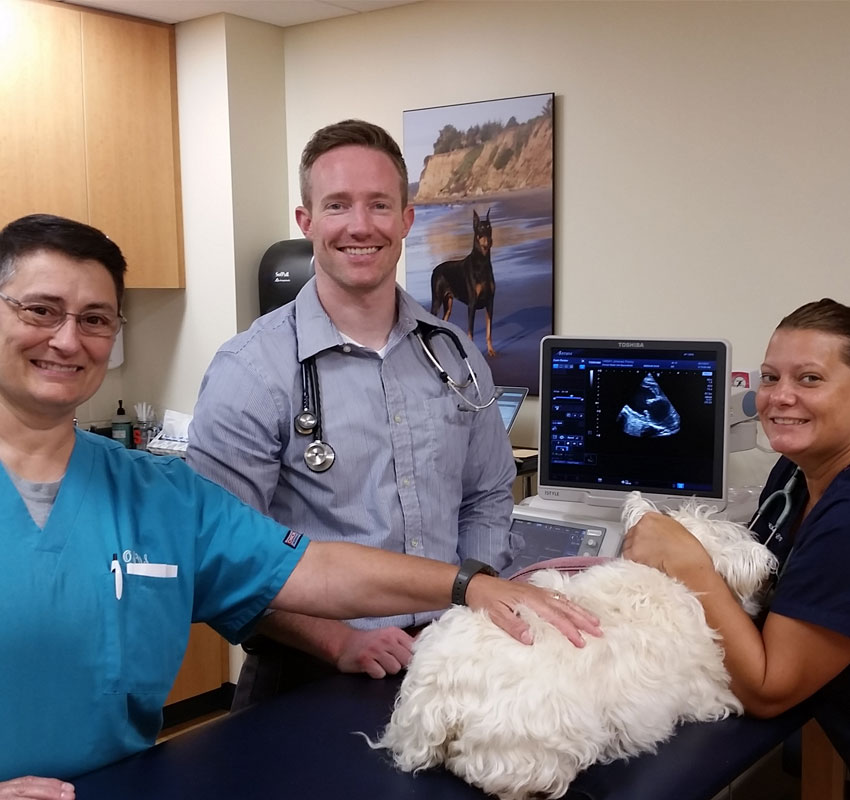How Accurate Are CT Scans For Dogs in Detecting Health Issues?}
Wiki Article
Checking Out the Important Providers Supplied by a Veterinary Cardiologist: Comprehending Ultrasound and CT Check Methods
Veterinary cardiologists play an important duty in the wellness of animals by identifying and dealing with numerous heart problems. They use innovative imaging techniques, such as cardiac ultrasound and CT scans, to give accurate evaluations. Each method has its distinct advantages and applications. Understanding these techniques is important for family pet owners seeking the best take care of their companions. What elements should animal proprietors consider when selecting in between these analysis tools?
The Function of Veterinary Cardiologists in Animal Healthcare
Veterinary cardiologists play an important duty in the health care of pets, concentrating especially on identifying and treating heart-related conditions. They have specialized training that permits them to translate complex diagnostic examinations and recognize numerous cardio problems. These specialists make use of innovative methods, such as echocardiography and electrocardiography, to examine heart feature and structure accurately.Veterinary cardiologists also create tailored therapy plans that might consist of medications, way of living adjustments, and, in many cases, medical treatments. Their competence reaches informing family pet owners concerning heart health, emphasizing the importance of regular check-ups and very early discovery of possible troubles. Cooperation with basic vets is crucial, as it assures detailed care for family pets with presumed cardiac issues. By supplying specialized solutions, vet cardiologists considerably enhance the lifestyle for animals and provide comfort for their proprietors, enhancing the significance of heart wellness in total pet dog health.Typical Cardiac Problems in Family Pets
Typical cardiac issues in pet dogs can greatly influence their health and wellness and lifestyle. Heart murmurs, different sorts of cardiomyopathy, and hereditary heart flaws are amongst the most prevalent problems that veterinarians come across. Ultrasound For Dogs. Comprehending these problems is essential for animal proprietors to assure prompt medical diagnosis and appropriate treatmentHeart Murmurs in Pets
Although heart murmurs can be a source of worry for pet dog proprietors, they are not constantly a sign of significant health issues. A heart whispering is an unusual sound generated by unstable blood flow within the heart. In animals, these whisperings can be brought on by different factors, consisting of congenital heart defects, shutoff issues, and even stress throughout assessments. Numerous animals with heart murmurs lead normal lives without considerable wellness effects. To determine the underlying reason, veterinary cardiologists commonly employ analysis methods such as echocardiograms and Doppler ultrasounds. Early discovery and evaluation are essential, as they might help take care of any possible heart issues effectively. Family pet proprietors are urged to consult their veterinarian for a detailed analysis if a heart murmur is found.Cardiomyopathy Kind Explained
Cardiomyopathy includes a group of illness influencing the heart muscle, leading to jeopardized cardiac function in pet dogs. One of the most common types consist of dilated cardiomyopathy (DCM), hypertrophic cardiomyopathy (HCM), and limiting cardiomyopathy (RCM) DCM mainly affects canines, creating the heart to increase the size of and damage, which lessens its capacity to pump blood effectively. On the other hand, HCM is extra widespread in cats, defined by the thickening of the heart wall surfaces, frequently leading to blocked blood circulation. RCM, though less common, takes place when the heart muscular tissue comes to be rigid, limiting its capability to full of blood. Each kind presents one-of-a-kind challenges in medical diagnosis and treatment, demanding specialized vet cardiological evaluation to assure peak monitoring and take care of influenced pet dogs.Hereditary Heart Issues
Genetic heart problems stand for a significant group of heart concerns in pets, unique from gotten conditions such as cardiomyopathy - CT Scans For Animals. These issues are architectural abnormalities present at birth, impacting the heart's typical feature. Typical types include patent ductus arteriosus, ventricular septal defects, and pulmonic stenosis. Symptoms may vary commonly, ranging from mild to extreme, and can include workout intolerance, coughing, and difficulty breathing. Early medical diagnosis through advanced imaging methods like ultrasound is necessary for efficient management. Veterinary cardiologists play a crucial duty in recognizing these problems and advising suitable therapy options, which may include clinical management or surgical intervention. Identifying hereditary heart problems permits much better end results and improved top quality of life for impacted petsUnderstanding Cardiac Ultrasound: How It Works
A substantial number of vet methods now utilize heart ultrasound as an essential analysis tool for assessing heart health and wellness in pets. This non-invasive strategy makes use of high-frequency sound waves to develop pictures of the heart's structure and function. During the treatment, a vet professional uses a gel to the animal's chest and makes use of a transducer to produce ultrasound waves. These waves bounce off the heart and bordering structures, creating real-time pictures on a monitor.Veterinarians can evaluate numerous aspects of cardiac health, including chamber dimension, wall surface movement, and valve function. In addition, cardiac ultrasound permits for the discovery of abnormalities such as fluid buildup and genetic heart issues. This strategy is vital for diagnosing problems that might not show up through common radiographs. By supplying thorough information regarding the heart's anatomy and efficiency, cardiac ultrasound help in developing reliable treatment plans for pets dealing with heart problem.The Significance of CT Scans in Detecting Heart Issues
How do CT scans enhance the medical diagnosis of heart disease in veterinary medication? CT scans supply comprehensive cross-sectional images of the heart and bordering structures, allowing vets to picture complex physiological connections. This imaging technique is particularly helpful in determining congenital heart problems, heart lumps, and problems in blood vessels. By using advanced imaging formulas, CT scans can assess heart chamber dimensions and function, supplying a comprehensive view that may be tough to accomplish with conventional methods.Additionally, CT angiography can imagine blood flow and identify areas of stenosis or obstruction, which is necessary for preparing possible treatments. The rate and precision of CT scans likewise assist in fast diagnoses, essential in emergency situations. Inevitably, the consolidation of CT scans right into vet cardiology greatly enhances the accuracy of medical diagnoses, enabling targeted therapy plans and boosting client end results for animals struggling with heart disease.Contrasting Ultrasound and CT Check Methods
While both ultrasound and CT scans are important tools in vet cardiology, they supply distinctive advantages and restrictions that influence their use in detecting heart disease. Ultrasound, or echocardiography, gives real-time imaging of the heart's structure and feature, permitting vets to evaluate heart chambers, valves, and blood circulation. It is especially reliable for evaluating conditions like heart disease and cardiomyopathy. However, ultrasound may be limited in envisioning particular physiological frameworks due to client dimension or obesity.In comparison, CT checks deal detailed cross-sectional photos of the heart and surrounding tissues, making them excellent for recognizing structural problems, tumors, or vascular concerns. CT scans offer thorough insights, they require sedation and might include radiation exposure. Eventually, the choice between ultrasound and CT checks depends upon the certain professional scenario, the individual's problem, and the details required for a precise medical diagnosis.Treatment Options Readily Available Via Vet Cardiology
Vet cardiology uses a series of therapy alternatives tailored to address various heart disease in animals. Therapy plans commonly start with lifestyle modifications, including diet plan adjustments and workout adjustments, focused on enhancing total heart health. Drugs play a vital role, with cardiologists prescribing medicines such as diuretics, beta-blockers, and ACE preventions to enhance and take care of signs and symptoms heart function.In much more severe instances, interventional procedures, such as balloon valvuloplasty or stent placement, may be needed to alleviate obstructions or improve blood flow. For particular congenital heart flaws, surgical options may be discovered to correct architectural problems. Furthermore, ongoing monitoring and follow-up care are crucial elements of a complete treatment plan, enabling timely modifications based on the pet dog's action to therapy. On the whole, veterinary cardiology concentrates on providing effective, individualized like optimize the wellness and health of pet patients with heart problems.Just how to Prepare Your Pet for a Heart Assessment
Preparing a family pet for a cardiac analysis is important to assure exact results and a smooth procedure. Proprietors must initially set up the appointment with the veterinary cardiologist and discuss any type of particular needs or issues. It is advisable to hold back food for at the very least 12 hours prior to the analysis, as this assists boost imaging high quality throughout procedures like ultrasound or CT scans.Additionally, keeping a calm atmosphere on the day of the consultation can assist lower the pet dog's anxiousness. It is beneficial to bring along any relevant clinical records, including previous examinations and medications (CT Scans For Animals). Proprietors ought to likewise make sure that their animal fits and leashed throughout transport to the clinic. Familiarizing themselves with the evaluation procedure can reduce concerns and help in asking educated inquiries throughout the appointment. By complying with these actions, owners can add greatly to the performance of the cardiac examinationFrequently Asked Concerns
The length of time Does a Heart Ultrasound or CT Check Take?
The period of a heart ultrasound generally varies from 30 to 60 minutes, while a CT scan might take about 15 to 30 minutes. Elements such as the patient's problem can affect these time quotes.
Exist Any Type Of Dangers Linked With These Diagnostic Treatments?

Can I Keep With My Pet During the Procedure?
The vet center's policy usually determines whether pet dog proprietors can remain during procedures. While some clinics motivate owner existence for convenience, others might call for separation to assure safety and security and suitable problems for analysis imaging.Just how much Do These Analysis Examinations Normally Cost?
The Board Certified Veterinary Cardiologist prices of diagnostic examinations, such as ultrasound and CT scans, usually vary based upon location and facility. Usually, costs range from a couple of hundred to over a thousand bucks, mirroring the intricacy and technology included.
What Is the Healing Process After a Heart Assessment?
The recuperation process after a cardiac examination entails monitoring the pet for any kind of instant responses, ensuring convenience, and restricting exercise. Vets typically offer post-evaluation instructions to guide family pet owners throughout this important recuperation duration. Heart murmurs, different types of cardiomyopathy, and hereditary heart defects are among the most prevalent problems that veterinarians encounter. A heart murmur is an unusual audio produced by turbulent blood circulation within the heart. Cardiomyopathy encompasses a group of conditions impacting the heart muscle, leading to endangered heart feature in pets. Congenital heart problems stand for a substantial classification of heart concerns in family pets, unique from gotten problems such as cardiomyopathy. Ultrasound, or echocardiography, provides real-time imaging of the heart's framework and feature, permitting veterinarians to examine heart chambers, valves, and blood flow.Report this wiki page